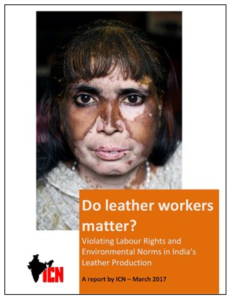A report released by the India Committee on the Netherlands finds that workers in India’s leather industry suffer serious labour and human rights violations. Most of the 2,5 million leather workers are found to be Dalits and Muslims, exploited due to their marginalised status. India supplies leather to huge global brands.

Rights violations mentioned in the report include wages below the stipulated minimum, unacceptable health risks due to the unsafe use of toxic chemicals, child labour, obstructions faced when organizing in trade unions and caste discrimination.
Caste discrimination in the leather industry
The report states that Dalits in the leather industry are often paid less than non-Dalit co-workers and that caste discrimination is seen to underpin the exploitative conditions, as leather work has traditionally been considered impure and a caste-based occupation. Wages are found to be much lower than for comparable work in other industries and the poor working conditions reflect that those engaged in this work have no alternatives.
Employers intimidate workers
The report also finds that employers try to control workers through intimidation.
“The leather exports sector, in the name of flexibility is trying to do everything at the cost of the workers … The employers can do this as they please and experiment with the workers’ lives simply because the industry is the only livelihood option for Dalits and minority Muslim workers,” says Tularam Sharma, leading the Uttar Pradesh Rural Workers Council, quoted in the report.
Das, a Dalit and leather worker who recently joined a workers union, elaborates on the barriers faced when trying to push for change.
“It is increasingly difficult to mobilize workers … Every day workers in various units are getting victimized. We fail to give them adequate support. We have no rights here.”
Global companies commit to fighting industry human rights abuses
In total 19 companies sourcing leather in India, including members if the Ethical Trading Initiative C&A, H&M, Primark, Inditex, Marks & Spencer, Next, TESCO, Sainsbury and Pentland, reacted to the report. Most companies recognize the urgency of addressing the issues identified and some shared concrete commitments to combat adverse human rights and environmental impacts in their supply chain.
